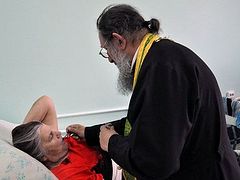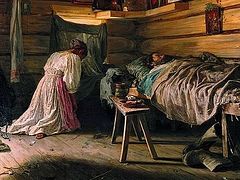Modern man can’t get sick. Man should go and smile everywhere with all 32 teeth, showing that everything’s fine with him now, and will be even better. Otherwise, you might be called unlucky, and there’s no way you can be unlucky in our society. In modern society, the cult of the healthy, successful man is stronger that it was with the Spartans. Open any magazine and see how everyone in it is successful, healthy, and beautiful. But, despite the attainments of modern medicine, there are more and more diseases every day. And when they catch up with you, you feel like a sufferer, like someone who’s fallen out of a plane.
When I landed in the hospital for almost two weeks, I had something to think about. In the first place, all my plans seemed to have been seriously rewritten by someone, and that “someone” had done it without being the slightest bit interested in my opinion. At first I tried to oppose it—I took handfuls of pills and injections, and put on a brave appearance, but then got worse, and I was taken off to the hospital in an ambulance with flashing lights.
Suddenly it seemed that my life did not belong to me—what’s more, even my own body ceased obeying me. Strong and fully functional before this, it had become sluggish and weak. And all the usual things that had seemed to be a part of me, also turned out not to be mine at all: Dear, beloved people, books, programs, thoughts, ideas—all remained somewhere out there, and I, helpless and weak, was here in a white-ceilinged room that smelled of medicine.
Suddenly you begin to think that, in actuality, nothing in the world belongs to you. Because the moment can come when you’re gone, and all this is left to others. At first this frightens you, but then you just start to pray. And this prayer differs very much from your usual distracted customary words of prayer. You don’t just pronounce the words of prayer, you weep and cry out, because all this is happening to you for real. And you’ve got to do something with this.
And at a certain moment a mysterious Someone touches your heart, and a calmness comes. In that calmness tears of repentance flow in streams, and from this your dry heart comes back to life, and unexpectedly you feel the kind of peace in your soul and the kind of repose that you felt in your mother’s arms during your childhood. You cease worrying and fussing, and entrust yourself into the hands of that mysterious Physician Who is holding your tormented heart in His hands, and you just quietly rejoice.
The saints, unlike us, did not complain, and greeted illnesses as dear guests. For, in giving themselves over into God’s hands with all their sorrows and infirmities, they disclosed the great mercy of God for man. The last Optina Elder, St. Nikon (Belyaev), wrote this from prison, where he had been thrown for being a monk:
“I have come to the conclusion that sorrow is nothing other than the emotional reaction of our heart when something happens against our own wishes, against our own will. For sorrow not to weigh you down grievously, you have to renounce your own will and humble yourself before God in all regards. God desires our salvation and devises it in a way incomprehensible to us. Entrust yourself to the will of God and you will find peace for your sorrowing soul and heart.”
The saints accepted sickness as God’s visitation, and in an incomprehensible way infirmity became a source of vivifying spiritual strength that transformed their souls. In sicknesses they became fellow partakers of Christ’s sufferings and ascended to hitherto unknown spiritual heights. They accepted illnesses humbly for their sins and became saints through humility and the grace of the Savior.
In the hospital I discovered what Orthodox friends are, and what common prayer is—which literally set me back on my feet. When my arms had begun to ache from the endless medical drips and my heart felt like someone had set an icy gravestone on it, I remembered all my Orthodox friends, among whom are many priests and monks, and began to beg for their prayerful help. And on my Facebook page I just wrote: “I ask your prayers! I’m lying in the hospital in serious condition.”
On the third day I woke up early in the morning, feeling totally well, with a long-forgotten desire to pray. Not because I “had to,” but because you just can’t do without prayer. This was a kind of reverent, wild hunger, exactly like that of a prisoner who has just broken out of a long incarceration!
The next day was Palm Sunday. I impatiently awaited morning, so as to quickly begin reading my prayer rule and, in general, to pray from my soul to the Most Holy Theotokos and all my favorite saints. I read it aloud—what’s there to be bashful about, if you’re lying in the room alone?! Suddenly there was a knock at the door: it was Andrei, from the next room, who, despite the early hour, was also not sleeping. Unexpectedly he embraced me, kissed me three times, and then said quietly, looking into my eyes: “Greetings with Palm Sunday, brother! Christ is in our midst! I’m tired of listening to you praying through the wall. Today’s a feast—let’s pray together!”
And I was praying behind closed doors, hiding like a partisan in the forest! And it turns out that this man goes to church, communes his son on Sundays, and drives to get on line for confession to a well-known priest at four in the morning. It just about touched me to tears. “There,” I thought, “God has sent me a brother.” And Andrei and I began to read the prayers together. We read, crossed ourselves, and made prostrations—it was a real pleasure!
And when the time came for the drip before my procedure, the nurse, Lyuba—I don’t know why—began to speak to me about God’s commandments and about how we can’t consider ourselves real Christians if we don’t fulfill them. For “then all our words about how we love Christ are a lie and black cunning—just some kind of horror!” “Do you understand me?” that wonderful Lyuba asked me, looking into my eyes. I nodded in agreement, and prayed silently, “Glory to Thee, O God, glory to Thee!” And I couldn’t stop.





